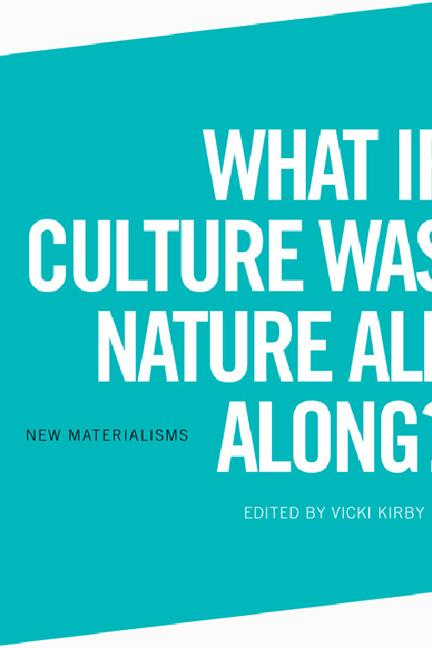Book contents
- Frontmatter
- Contents
- Acknowledgements
- Foreword
- 1 Matter out of Place: ‘New Materialism’ in Review
- 2 Method Matters: The Ethics of Exclusion
- 3 Sensory Substitution: The Plasticity of the Eye/I
- 4 Allergy as the Puzzle of Causality
- 5 Pregnant Men: Paternal Postnatal Depression and a Culture of Hormones
- 6 Material Culture: Epigenetics and the Molecularisation of the Social
- 7 Racialised Visual Encounters
- 8 Microbiology as Sociology: The Strange Sociality of Slime
- 9 Nature Represents Itself: Bibliophilia in a Changing Climate
- 10 Climate Change, Socially Synchronised: Are We Really Running out of Time?
- 11 A Sociality of Death: Towards a New Materialist Politics and Ethics of Life Itself
- Notes on Contributors
- Index
11 - A Sociality of Death: Towards a New Materialist Politics and Ethics of Life Itself
Published online by Cambridge University Press: 22 December 2017
- Frontmatter
- Contents
- Acknowledgements
- Foreword
- 1 Matter out of Place: ‘New Materialism’ in Review
- 2 Method Matters: The Ethics of Exclusion
- 3 Sensory Substitution: The Plasticity of the Eye/I
- 4 Allergy as the Puzzle of Causality
- 5 Pregnant Men: Paternal Postnatal Depression and a Culture of Hormones
- 6 Material Culture: Epigenetics and the Molecularisation of the Social
- 7 Racialised Visual Encounters
- 8 Microbiology as Sociology: The Strange Sociality of Slime
- 9 Nature Represents Itself: Bibliophilia in a Changing Climate
- 10 Climate Change, Socially Synchronised: Are We Really Running out of Time?
- 11 A Sociality of Death: Towards a New Materialist Politics and Ethics of Life Itself
- Notes on Contributors
- Index
Summary
New Materialist Ontologies
Introducing the new materialisms in the seminal anthology of the same name, the editors, Diana Coole and Samantha Frost (2010), provide us with a sense of the sociological import of this contemporary field. Materiality, they contend, is everywhere. It is the very stuff of the quotidian: the dependence of our existence on ‘diverse species’, our bodily and cellular reactions, ‘the material artifacts and natural stuff that populate our environment’, and the ‘socioeconomic structures that produce and reproduce the conditions of our everyday lives’ (2010: 1). Such reckonings with materiality demand an analysis commensurate with the ubiquity and complexity of its myriad relations and processes. Thus, as the editors outline, new materialist perspectives emphasise matter as a way to both identify and to address some of the most ‘urgent challenges’ in contemporary society (2010: 3). Their aim is to return our focus to ‘material phenomena and processes’ that have been de facto neglected by the ‘dominance of analytical and normative political theory’ and the styles of ‘radical constructivism’ that characterise Anglophone and Continental traditions associated with ‘the cultural turn’ (2010: 3).
With this focus, new materialism should not be regarded as a neopositivist approach that might take materiality for granted as the mere foundation of sociological concerns. Matter does not presuppose the ‘baser desires of biological material’ or the ‘inertia of physical stuff’ that is inferior to a ‘host of immaterial things’ (2010: 2). Nor can it be reified for the purposes of critical interventions that aim to think its processes differently. On the contrary, new materialism opens the dualisms that would insist on matter's separation from mind, cognition, language, representation, and so on. Instead, it offers a different, we could say broadened, ontology that puts into question the nature of materiality itself, as well as the status and shape of the human actors who would ordinarily comprise our conventional understandings of ‘the social’. It is this non-dualist (Dolphijn and van der Tuin 2012, Coole and Frost 2010) and posthumanist (Irni 2013; Coole and Frost 2010; Thiele 2014) orientation within new materialism that redefines material activity beyond ‘substantialist Cartesian or mechanistic Newtonian accounts of matter’ (Coole and Frost 2010: 12–13), and it requires that humans, ‘including theorists themselves, be recognised as thoroughly immersed within materiality's productive contingencies’ (Coole and Frost 2010: 7).
- Type
- Chapter
- Information
- What if Culture was Nature all Along? , pp. 223 - 247Publisher: Edinburgh University PressPrint publication year: 2017



